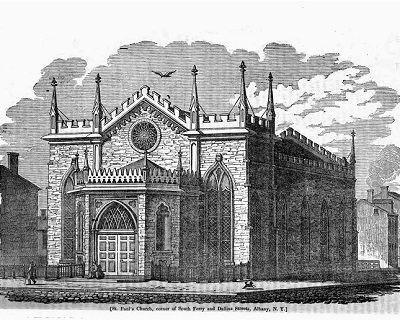It was one hundred years today that the brass tablet honoring the ministry of Harry John Van Allen, first deaf priest in the Diocese of Albany, was installed near the baptistery of St. Paul’s Lancaster Street building. The service that Sunday afternoon featured a sermon by our rector, Roelif Hasbrouck Brooks, an address by Oliver Allen Betts, principal of the New York School for the Deaf in Rome, and a musical program by St. Paul’s choir. Mr. Betts interpreted the service and the music for the many deaf persons who attended. The tablet was unveiled by Harry’s daughter, Mary Oliver Van Allen. The tablet was originally paired with a bas relief of Harry, which, unfortunately, we no longer have.[i]
In his sermon, Dr. Brooks “upheld Dr. Van Allen’s life as an example for all persons.” I’m pleased that the tablet is still prominently displayed near the chapel door, still reminding us of Harry Van Allen’s life of service.
As an aside, I’d like to expand on a point made In a previous post in which I told something of Harry Van Allen’s impressive record as missionary to the deaf in the dioceses of Albany and Central New York. I mentioned briefly that Bishop William Croswell Doane had initially been reluctant to accept Van Allen as a candidate for holy orders. This is a controversy we know about only thanks to two articles in The Silent Worker, a publication of the New Jersey School for Deaf-Mutes. The first, from October 1895, reports:
We are informed that Mr. Van Allen, formerly an instructor in the Pennsylvania Institution, having studied for the ministry, applied some time ago to the Protestant Episcopal Bishop of Albany, for ordination. The Bishop thought that it would be against the rules of the church to ordain to the ministry a man who is deaf, and he expressed his intention to bring the question up before the General Convention of the Episcopal Church in Minneapolis.
We have followed the reports of the Convention, so far as published up to our going to press, but have seen not notice of such action.
There was, at last date, a proposed canon on ordination in committee, but the text was not given in the reports.
The question was settled in favor of the deaf, so far as the diocese of Pennsylvania is concerned, some twelve years ago, we think, when the late Henry Winter Syle presented his learned and well-reasoned argument in support of his own application to be ordained by Bishop Stevens.”[ii]
followed by this update two months later:
We learn that Bishop Doane of the Diocese of Albany has, after careful investigation, changed his opinion that a deaf man cannot properly be admitted to the ministry, and has decided to ordain Mr. Henry (sic) Van Allen. We are very glad to hear this, as Mr. Van Allen will, we are sure from our knowledge of him, be a useful and acceptable minister to the deaf.
The Bishop’s willingness to change a conviction formed on insufficient consideration does him honor.[iii]
Bishop Doane’s own description of Harry’s ordination to the diaconate mentions the question of the “fitness” of ordaining a deaf person, and concludes with an aside that may explain his reluctance:
Friday, December 16th [1898], in the Cathedral, I ordained the Rev. Harry Van Allen to the diaconate. Dr. Silliman presented him and Dr. Pendleton preached the sermon. The Rev. Dr. Chamberlain interpreted the service, being one of the three clergymen devoted to the deaf-mute work. There were present beside, the Rev. Canon Fulcher, the Rev. Dr. Sill, and Messrs. J. N. Marvin, Paul Birdsall and Hegeman. Dr. Pendleton’s sermon added greatly to the interest of the service, both in its vindication of the fitness of ordaining a deaf-mute to the sacred ministry, nd in its statement of the work that has been already accomplished among them.
While I have no question that such an ordination is perfectly justified, I felt bound to instruct the deacon, who is able somewhat to use articulate speech, always to repeat the words in the administration of Holy Baptism with his lips, in addition to saying them in the sign language.[iv]
It appears, then, that Bishop Doane was not in agreement with those bishops who, believing “that impairment of one of the senses was an impediment to ordination,” had opposed the 1876 ordination of Henry Winter Syle.[v] Rather, Doane, was concerned that the words of a sacrament (for a deacon, baptism) be spoken aloud. Because Harry Van Allen had become deaf at age 9, he spoke intelligibly, and was able to comply with this requirement.
[i] “Bronze Tablet Erected in St. Paul’s Church to Memory of Dr. Van Allen,” Albany Knickerbocker Press 14 Jun 1920.
[ii] The Silent Worker, volume 8, number 2 (October 1895), 9.
[iii] The Silent Worker, volume 8, number 4 (December 1895), 8.
[iv] “The Bishop’s Address,” Journal of the Proceedings of the Thirty-first Convention of the Protestant Episcopal Church in the Diocese of Albany (Albany: Weed-Parsons Printing, 1899), 45.
[v] Episcopal Church, Holy Women, Holy Men: Celebrating the Saints (New York: Church Pub. Inc., 2010), 542.




